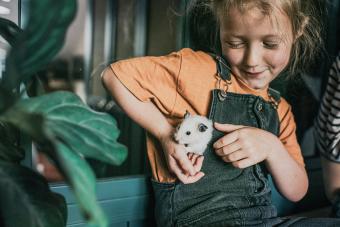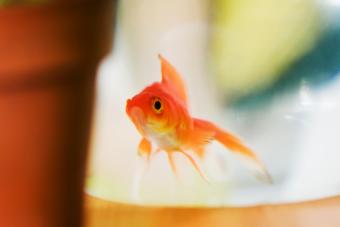
Kids and pets are drawn together. There's no mistaking the excitement we see in a child's face when they meet a new pup or friendly old cat. More often than not, our kids end up wanting a pet of their own. It's easier for some families to start small, however, and wait on getting a dog or cat. Picking out your little one's new best friend will require a bit of research so you find the best match for your home and family. Take your time, weigh the responsibilities, and consider these nine small pets that are likely to be the best fit for you and your kids.
Guinea Pigs

Guinea pigs are a great choice for kids looking for a companion animal who enjoys wandering and eating veggies out of their hands. They're easy to care for and can easily be kept in a ventilated cage. They don't require any special equipment beyond their cage, and food and water bowls. Unlike some other pets that require regular grooming, guinea pigs don't need much maintenance beyond daily feeding and cleaning of the area they live in.
Some people choose not to litter-train their Guinea pig, but it is possible if you want your pet to use a litter box like cats do, which is an excellent way to keep their living space tidy. If you choose to go this route, remember that it may take some time before your piglet gets used to their new bathroom habit.
Guinea pigs can also be trained with positive reinforcement techniques. They can be taught how to use wheels as well as run through mazes and tunnels if given the time and opportunity. These small pets greatly enjoy human interaction, especially if it begins at a young age.
Guinea pigs typically live between 5 and 8 years, so make sure you have plenty of time and are willing to make the commitment when deciding whether or not this might be the pet for your family.
Gerbils

Gerbils are a good choice for a pet if you have time to spend with them and they don't need to be taken out of the cage often. Gerbils naturally live in groups, so it's important to get at least two gerbils. Gerbils are nocturnal, so they will be active during the night and sleep during the day. They like to burrow in their bedding, so you'll need to give them something soft to burrow in, like shredded paper or hay.
Gerbils are social animals, so they do best when kept as part of a group. They also enjoy being handled by humans, but this should be done infrequently because it can stress them out too much.
According to The American Gerbil Society, the average lifespan for a male gerbil is about 2 years, while the average lifespan for a female gerbil is about 3 years.
Hamsters

Hamsters are good pets for children because they're easy to care for and are inexpensive. They also come in a variety of colors and sizes, so you can choose one that suits your child's personality.
Hamsters are social animals, which means they enjoy the company of other hamsters or humans. You may need to get two hamsters. Otherwise, your hamster could become lonely without any playmates. Hamsters should be kept in pairs or groups at all times because they can become depressed when isolated from others of their species.
Hamsters are considered exotic pets, so they need special care and attention to ensure they live long and happy lives. If you take proper care of your hamster, they can live up to 5 years. However, their average lifespan is about 3 years. Females tend to live longer than males because their bodies are smaller and less prone to getting sick compared with males who often suffer from health issues due to their larger size.
Fish

When it comes to small pets, fish can be a great choice for kids. Freshwater species that remain small -- like a betta or cardinal tetra -- are relatively easy to care for, plus they're a great option for kids with allergies. Many freshwater fish can live in smaller aquariums, depending on which species you choose. You'll need to clean out their tank regularly, perform water changes, remove any waste, and replace water that has evaporated. You'll also need to feed them on a regular schedule and make sure that the food is high-quality.
If you want to get more involved with your fish's care, it can be fun to learn about their different behaviors and personalities. The life expectancy of a fish depends on many factors, including the species and habitat. Most fish have a lifespan of around 3 to 5 years, although some can live for much longer.
Rabbits

Rabbits make great pets. They love to be held, cuddled, and petted. They are very affectionate and can be trained to come when called. Rabbits are fairly clean and will use the litter box if you provide one. They also need a cage that is large enough for them to stretch out in and exercise. Rabbits like company and can be housed with other rabbits.
The average life expectancy of a rabbit is seven to 10 years. However, some rabbits have been known to live as long as 12 years.
Mice and Rats

Mice and rats are easy to care for because they're small, but they still need daily care, including cleaning out their bedding, giving them fresh water and food every day, and making sure they have exercise time outside their cage. They're easy to handle because they are small enough to pick up and hold in the palm of your hand. Just make sure to wash your hands with soap before and after they're handled. Also, remember when holding them not to squeeze too hard because it could hurt them.
Rats can be trained through positive reinforcement techniques, such as clicker training. Rats are very intelligent, and can even learn how to turn on lights by pressing buttons or switches. You'll want two per cage, so there's plenty of room for both genders' needs; however, keep in mind that if you have a male and a female, you're likely to end up with baby rats before very long. To avoid this, keep two females together, and introduce them to their enclosure at the same time.
The average mouse lifespan is 2 to 3 years, while rats can live up to 3 years, according to the Humane Society of the United States.
Parakeets

Parakeets are small, colorful birds that make wonderful pets. Parakeets are typically kept in a cage enclosure, but some bird keepers set up special areas in their homes to allow bird to fly. It's important to make sure these areas are safe for your bird, however. Close all curtains in the flight area, make sure the bird cannot escape, and ensure they are protected from other pets.
They can be taught to talk and whistle, but they do not always learn these skills successfully. They are very social creatures and enjoy spending time with their owners in the same room as them. The best way to keep a parakeet happy is by giving them plenty of toys and things to chew on, as well as fresh fruits and vegetables daily. They also enjoy bathing in bowls of water at least once per day, but this should not be done more often than necessary because it could dry out their skin.
Parakeets typically live between 5 and 10 years, though some people have reported parakeets living to be 15 years old. If you take care of your parakeet well, you can expect them to live a long and healthy life.
Leopard Geckos

Leopard geckos are a great choice for younger pet owners. They are small, easy to care for, and don't require much space or attention, as long as they are fed regularly and their environment is cleaned often. They can be kept in a simple tank with the right substrate and temperature. They also don't need any special lighting or expensive decorations; all you need is a few hides for them to take shelter in and some safe decorations, such as artificial plants designed for reptile enclosures.
Leopard geckos are hardy little creatures that can live up to 20 years, though they typically live between 6 and 10 years. Their diets consist mostly of bugs and worms, which can be purchased from most pet stores. If you're looking for something cute but low-maintenance then a leopard gecko might be just what you're looking for!
Ferrets

Ferrets are very popular as small pets, and for good reason. However, they are not legal in all states and are totally banned in California and Hawaii, so check your local laws before trying to obtain one.
They're relatively small, easy to handle and train, and are social animals who enjoy human interaction. They can be playful and active, but also calm enough to fall asleep while you hold them. They're clean animals who rarely produce odors in their cages or litter boxes (though ferrets do produce a natural musk scent that some people do not like).
Ferrets can be great pets for children because they love attention and tend not to bite unless they are provoked or frightened by sudden movements. This means ferrets are best left to older children who can be taught how to handle them properly and safely. If your child wants a furry friend but you have concerns about allergies or other issues with other types of pets, a ferret can be a good choice. Ferret lovers report that the little critters will even cuddle up next to kids; how cute does that sound?
The average life expectancy of a ferret is 7 to 10 years. However, some ferrets have been known to live as long as 14 years.
Choose Carefully
Make your choice carefully. You're not just deciding on an animal, you're deciding on a companion who will accompany you and your children for years to come. Remember, a pet is a commitment. Start by asking yourself some questions: Do I have the time and energy for a pet? Do I have enough space in my home for the animal? Is my schedule too hectic for an animal that needs constant attention? If the answer to these questions is "No," then maybe getting a pet isn't right for you and your children, at least right now. However, if all of those answers are "Yes!", then you can go ahead and consider adopting a pet for you and your child.







